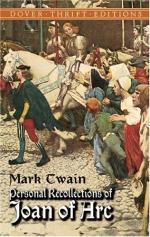Well, the time was approaching for the Great Trial. For more than two months Cauchon had been raking and scraping everywhere for any odds and ends of evidence or suspicion or conjecture that might be usable against Joan, and carefully suppressing all evidence that came to hand in her favor. He had limitless ways and means and powers at his disposal for preparing and strengthening the case for the prosecution, and he used them all.
But Joan had no one to prepare her case for her, and she was shut up in those stone walls and had no friend to appeal to for help. And as for witnesses, she could not call a single one in her defense; they were all far away, under the French flag, and this was an English court; they would have been seized and hanged if they had shown their faces at the gates of Rouen. No, the prisoner must be the sole witness—witness for the prosecution, witness for the defense; and with a verdict of death resolved upon before the doors were opened for the court’s first sitting.
When she learned that the court was made up of ecclesiastics in the interest of the English, she begged that in fairness an equal number of priests of the French party should be added to these.
Cauchon scoffed at her message, and would not even deign to answer it.
By the law of the Church—she being a minor under twenty-one—it was her right to have counsel to conduct her case, advise her how to answer when questioned, and protect her from falling into traps set by cunning devices of the prosecution. She probably did not know that this was her right, and that she could demand it and require it, for there was none to tell her that; but she begged for this help, at any rate. Cauchon refused it. She urged and implored, pleading her youth and her ignorance of the complexities and intricacies of the law and of legal procedure. Cauchon refused again, and said she must get along with her case as best she might by herself. Ah, his heart was a stone.
Cauchon prepared the proces verbal. I will simplify that by calling it the Bill of Particulars. It was a detailed list of the charges against her, and formed the basis of the trial. Charges? It was a list of suspicions and public rumors—those were the words used. It was merely charged that she was suspected of having been guilty of heresies, witchcraft, and other such offenses against religion.
Now by the law of the Church, a trial of that sort could not be begun until a searching inquiry had been made into the history and character of the accused, and it was essential that the result of this inquiry be added to the proces verbal and form a part of it. You remember that that was the first thing they did before the trial at Poitiers. They did it again now. An ecclesiastic was sent to Domremy. There and all about the neighborhood he made an exhaustive search into Joan’s history and character, and came back with his verdict. It was very clear. The searcher reported that he found Joan’s character to be in every way what he “would like his own sister’s character to be.” Just about the same report that was brought back to Poitiers, you see. Joan’s was a character which could endure the minutest examination.




